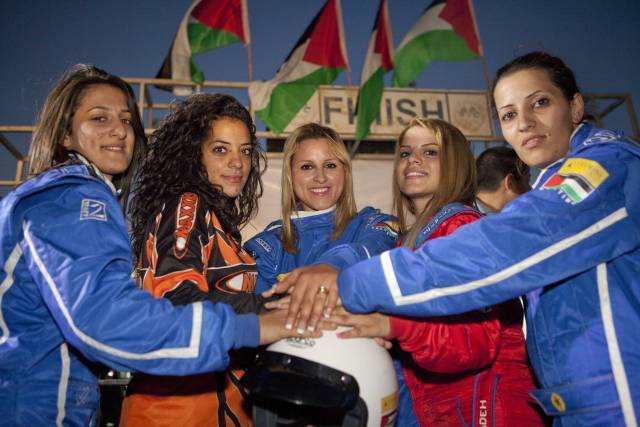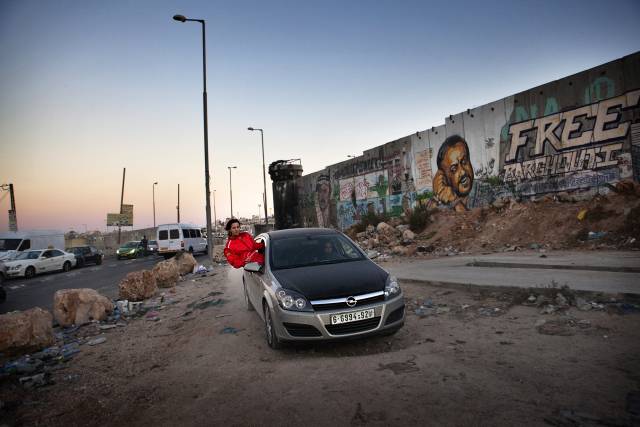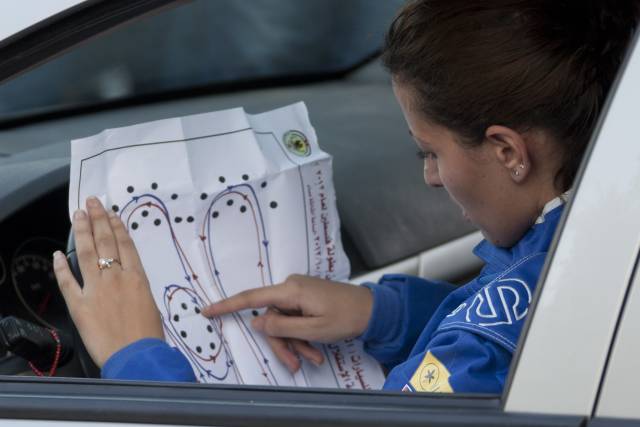
 Within the occupied land of Palestine, under the constant threat of violence and uncertainty, an emerging community of racing drivers is flourishing. Since its introduction in 2005, the relatively new sport has become an activity that has not only breathed joy in a region fraught with political conflict, but has also created life changing opportunities for a motor racing team of extraordinary young women known as Speed Sisters. Amber Fares captures the lives of the five women in her first feature-length documentary, Speed Sisters, an exciting film about Arab women living life on their own terms.
Within the occupied land of Palestine, under the constant threat of violence and uncertainty, an emerging community of racing drivers is flourishing. Since its introduction in 2005, the relatively new sport has become an activity that has not only breathed joy in a region fraught with political conflict, but has also created life changing opportunities for a motor racing team of extraordinary young women known as Speed Sisters. Amber Fares captures the lives of the five women in her first feature-length documentary, Speed Sisters, an exciting film about Arab women living life on their own terms.
Fares, a Canadian of Lebanese descent, earned an MBA at the University of Calgary in Marketing and International Business. She used her marketing prowess to segue into filmmaking and co-founded SocDoc Studios to produce story-driven films that explore social issues. We recently met with the director and one of the subjects of the film, Noor Daoud, an international racing star and the only female drift racer in the Middle East, to talk about the experience of making the film.
How long was the entire shoot?
Amber Fares: It took about four years to shoot and then another year to edit, but I had been living in Palestine already when I came across the [Speed Sisters]. Noor lived down the street from me in Ramallah, so we were kind of on her all the time. We got to spend a lot of time together.
How did you discover Speed Sisters?
Amber Fares: A friend of mine invited me and my producer Avi [Goldstein] to a race in Bethlehem. I was like, a car race in Bethlehem? Given the occupation and the restrictions on movement and on space, I thought, what kind of car racing are they doing? It was really unusual, so of course we went. When we got there, it was on the top of this hill on this huge tarmac that was used for President Arafat’s helicopter landing pad.
It was a big tarmac and there were close to a thousand people. They had music and cars revving and in the middle of that, I think it was Noor, Marah [Zahalka] and Betty [Saadeh]. These women [which also include Mona Ali and team captain Maysoon Jayyusi] were putting on helmets and getting ready to race. It was so incredibly surprising that I just needed to get to know them. It was such an interesting way to tell the story of a place through these unexpected women.
How did you feel when Amber approached you about the documentary?
Noor Daoud: Really excited. For me I was very excited. Also, [Amber] was very friendly. She’s a great director, she’s amazing.
It sounds like you became friends in the process.
Amber Fares: Yeah, definitely. The thing is, Palestinian society is super warm and hospitable and open. We became friends with all the girls, but also these families really took us in as well. It was really such a joy to be able to get that kind of perspective of that place with these amazing families. These girls really took me on a magical ride through Palestine, a place that we all have such a particular view of because of what we see in the media. What I think this film does is to say, "Yes that stuff happens. But even beyond that, you have people that are like us trying to live their lives in the best way they possibly can." These girls provided a different view of Palestine, as well.
It’s really wonderful to watch your interactions with the other girls, Noor, especially how your friendship with Marah plays out in the film. How have your relationships with the team evolved since shooting?
Noor Daoud: We’re always close. We’re a team and we’re always nice to each other. Of course, in the end we’re competing with each other, but we are very supportive of one another. And we’re still close.
Did you have a specific narrative in mind going into the project?
Amber Fares: This was the first feature-length film that I had made, so I couldn’t have predicted that that narrative would happen. It was really just spending a lot of time there. Because I was living in Palestine, I could react to things a lot faster than if I were flying in every two weeks. I could pick up the camera and go down the street, or the other girls were just a car ride away. I wanted to tell a story about their lives that hadn’t been told before. I wanted it to be beyond the politics and the stereotypes that we have of that region. But I had no idea that racing would’ve played out the way that it did.
We just knew we had amazing characters. These girls all have strong personalities and they had their own dreams and desires. As a filmmaker, that is such an amazing gift. On top of that you have sports-- there’s an inherent tension in sports-- and the fact that the place they are living in is so volatile. There was so much to work with. I was very lucky that it all fit that way.
There’s so much action.
Amber Fares: It’s great because the girls are so physical and constantly doing things. You’re always in the moment. They aren’t just sitting at home. They are out doing things in the world.
 Previously, you had a career in marketing. Did you always have a desire to become a filmmaker?
Previously, you had a career in marketing. Did you always have a desire to become a filmmaker?
Amber Fares: I grew up in a small town in northern Canada, in Alberta. When I was growing up, I used to make a lot of videos for school and I would get my friends to do things. I never really thought of film as a viable career, but I’d always loved storytelling. It was really when I got to Palestine that it was easy to see those stories come to life. I used my marketing background to talk my way into NGOs. I would pitch short stories, they would hire me, and then I would go online to figure out how to white balance my camera. There are tons of filmmakers and journalists there and I would ask for advice. So I really taught myself how to make films. Then this film came across and we ended up getting a lot of support from places like Sundance, Doha and Brit Docs that provided a lot of support and help.
Noor, I love how you say in the film that drifting and car racing fit your identity perfectly, from your hair to your style to your personality. What did you feel when you discovered that this sport was so authentic to you?
Noor Daoud: I love sports so much. Since I was young I was playing so many different sports, but I didn’t know which one was for me. What was for Noor. I did swimming, tennis, boxing-- so many things. I always loved cars, but I never thought of being a car racer. I don’t know why. I guess I just thought it was impossible or something, especially in my country. All of a sudden, one day I saw there was racing in Palestine. I got so excited. It all started from there. I felt the power. I felt the speed. I have so many fans now because they like what I’m doing. They love what I’m doing. I love what I’m doing.
Amber Fares: Noor is the only female drift racer in the Middle East. When we’re talking about drifting we’re talking about high speed and kind of going sideways, a newer sport.
Noor Daoud: It’s one of the most dangerous sports. And I like that because I like extreme sports.
Do you ever get scared?
Noor Daoud: I never get scared.
Amber Fares: I get scared driving with her. Not when she drifts, but just when she’s driving on the highway.
Noor Daoud: Sometimes she makes me drive her car because it doesn’t speed that much.
How did you change as a person?
Noor Daoud: I discovered myself more. I didn’t change in any way. I like myself more now. It wasn’t like I was insecure before, no. It was just that I was lost. I didn’t know where to go. But then I got connected with racing. This is my life. This is all I want.
Amber Fares: I think for Noor-- I just want to say in my seeing her growth-- is that when she discovered drifting especially, it gave her a lot of confidence and that confidence spilled out in other areas of her life. And also, which is really amazing, is to to see how the racing community embraced her. The racing community both in Palestine and through the greater Middle East is predominantly male, as it is everywhere. They embraced all the Speed Sisters. They are really welcoming and supportive.
The film does a great job of showing that support. How difficult was the shoot, Amber? At one point, Marah has to walk through a checkpoint to enter Israel from Palestine. It’s filmed with a handheld camera. Did you have difficulty getting permission to shoot?
Amber Fares: There were no permissions given for anything! We used a lot of GoPros which were really small.
Did you keep them hidden?
Amber Fares: We didn’t even hide them. For that scene where Marah goes to the checkpoint and Noor drives through, that happened in real time. We had one GoPro mounted in Noor’s car, and then I held the other one and walked through with Marah.
I would just film until I was told not to. When I was told not to, I’d stop. Nobody stopped me at that particular time. But in terms of getting permission in Palestine, we just filmed. The people were so behind this film. We were rarely told not to. We were allowed to film in restaurants and homes. There are so many cameras [in Palestine], we have so many journalists. There are cameras everywhere. Filming at the checkpoint, I don’t think we would have been able to get permission. I would just film until somebody told me not to do it.
Were you ever nervous about it?
Amber Fares: Definitely. In the scenes where there was violence, it was really nerve-racking
Noor Daoud: [In the scene where] Maysoon was was driving, there was all this tear gas. It’s pretty stressful.
Amber Fares: I tried to stay in areas where the journalists were, trying to find places that weren’t in the crossfire.
 Were you there when one of the Speed Sisters got shot?
Were you there when one of the Speed Sisters got shot?
Amber Fares: Yeah. That was really terrifying. We went there to train and we had journalists. It was unprovoked. It was tear gas. If they had shot that up in the air, we would’ve ran, but the first shot was directly at her. We weren’t expecting that to happen.
Noor Daoud: Because we used to go there a lot to train.
Amber Fares: But that just goes to show you how arbitrary the occupation is. Individual soldiers can make those kinds of decisions. There are no repercussions or accountability for those types of actions. That’s a good example of how random and dangerous the occupation can be despite the fact that these girls are doing these amazing things. It still affects them like it would affect anyone.
How has your life changed since the documentary wrapped?
Noor Daoud: Since the movie, a lot of things have changed. Me moving to Dubai. I have a new job [as a] skydiving instructor indoors.
Was that a new sport you discovered, or had you skydived before?
Noor Daoud: I never skydived before. It’s pretty fun, you meet a lot of people. I’m the person that loves to socialize and meet new people every day.
You live life to the fullest!
Noor Daoud: Yeah. I look forward to it.
What was the most rewarding part of this project for you?
Amber Fares: There’s so much of it. When I look at that film, which I’m incredibly proud of, it brings back a lot of really amazing memories. I think for me, it’s really having the reactions of the audiences. These girls are really heroes, and people will look up to them. These five strong, amazing women from Palestine are inspiring people from all over the world.
For more information on Speed Sisters visit https://speedsisters.tv/